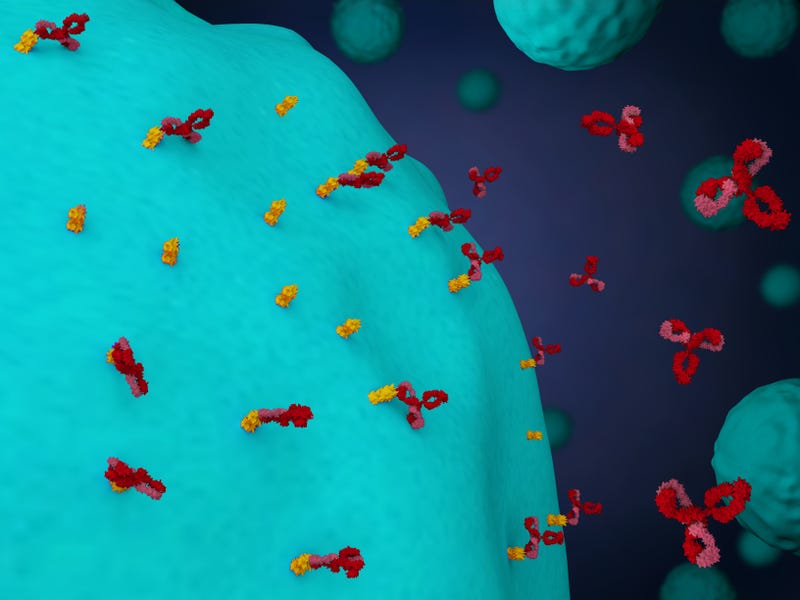
Every one of 12 rectal cancer patients who received immunotherapy during a recent clinical trial saw their tumors disappear completely, shocking even the doctors who conducted the study.
“The immunotherapy shrank the tumors much faster than I expected,” said Dr. Andrea Cercek, according to Memorial Sloan Kettering Cancer Center in New York, where the patients were treated. “My research nurse Jenna Sinopoli would tell me, ‘the patient has only received one treatment and already they’re not bleeding anymore and their terrible pain has gone away.’”
Each of the patients was treated with dostarlimab, a monoclonal antibody.
“Monoclonal antibodies are laboratory-made proteins that mimic the immune system’s ability to fight off harmful pathogens,” explained the U.S. Food and Drug Administration in a press release from earlier this year. Most people have probably heard of monoclonal antibodies as a treatment for COVID-19, which the press release was about.
Many monoclonal antibodies have also been used as targeted cancer therapy, according to the National Cancer Institute. Dostarlimab targets PD-1, a protein found on immune cells.
All of the patients who received the drug during the trial had “a clinical complete response, with no evidence of tumor on magnetic resonance imaging,” and other testing methods, according to results published June 5 in the New England Journal of Medicine.
None of the patients had received chemoradiotherapy or undergone surgery. Even so, there were “no cases of progression or recurrence” reported during the six to 25-month follow-up range.
“It’s incredibly rewarding,” said Cercek. “To get these happy tears and happy emails from the patients in this study who finish treatment and realize, ‘Oh my God, I get to keep all my normal body functions that I feared I might lose to radiation or surgery.’”
One of those patients was 38-year-old Sascha Roth, who was scheduled to undergo weeks of radiation therapy for rectal cancer when Cercek called her to say that evidence of her cancer had disappeared.
“I was so happy,” said Roth, who went through six months of the monoclonal antibody treatment and was the first patient in the clinical trial. Nearly two years after the trial began, she is still cancer free.
Roth and the other patients who participated in the trial received dostarlimab every three weeks for six months. Patients had stage II or III rectal adenocarcinoma.
According to Memorial Sloan Kettering, they are a “subset of patients whose tumor contain a specific genetic mutation,” called mismatch repair-deficient or (MMRd) or microsatellite instability (MSI). Out of the 45,000 Americans diagnosed with rectal cancer annually, around 5% to 10% have MMRd tumors, said the hospital.
“An MMRd tumor develops a defect in its ability to repair certain types of mutations that occur in cells,” said oncologist Dr. Luis Diaz, who also worked on the study. “When those mutations accumulate in the tumor, they stimulate the immune system, which attacks the mutation-ridden cancer cells.”
Before the trial, Diaz had already seen immunotherapy help patients with MMRd tumors that had spread.
Though the published study said 12 patients have been cured with the treatment, the hospital said there have been “14 – and counting” patients helped by the treatment as of June 5. Doctors at Memorial Sloan Kettering are also looking for more eligible patients to sign up.
They hope this could help mitigate the “disturbing rise” in colorectal cancer in people under 50.
“We are seeing more and more young people with rectal cancer, including people in their 20s in our trial,” said Cercek. “Immunotherapy might be an important new option for them.”
Additionally, this therapy may open doors to new types of treatment for other cancers. That could mean that less people will be subjected to side effects associated with the current standard treatments for rectal and other cancers – surgery radiation, and chemotherapy.
For example, rectal cancer patients “can suffer life-altering bowel and bladder dysfunction, incontinence, infertility, sexual dysfunction, and more,” from these treatments, said Cercek. Those complications can wear on patients’ mental health, Diaz added.
“We are investigating if this same method may help other cancers where the treatments are often life-altering and tumors can be MMRd,” said Diaz. “We are currently enrolling patients with gastric (stomach), prostate, and pancreatic cancers.”
LISTEN on the Audacy App
Sign up and follow Audacy
Facebook | Twitter | Instagram


